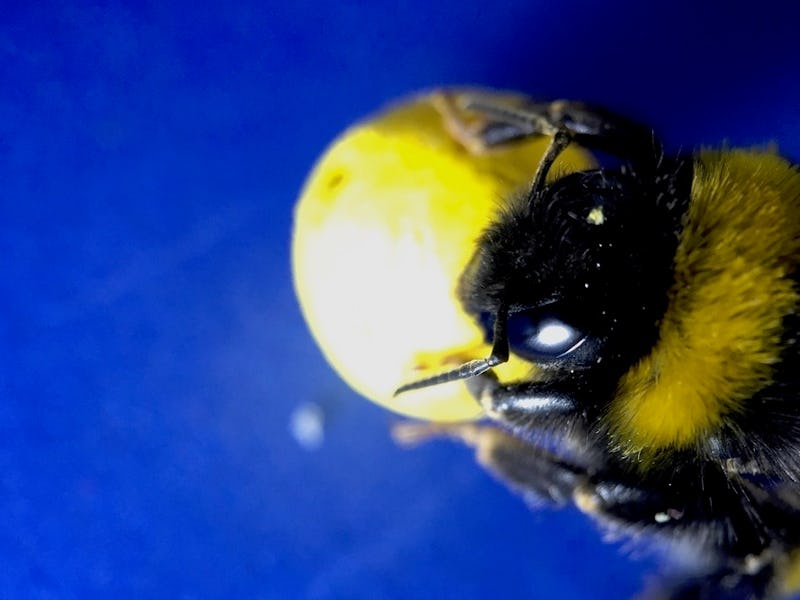We Taught Bees to Play Soccer to Figure Out Their Brain
These tiny machines have some serious brainpower.

By Clint Perry and Olli Loukola, Queen Mary University of London
Most people don’t often think about bees’ brainpower. Bees are generally regarded as tiny unthinking machines, flying from flower to flower, genetically pre-programmed to collect pollen and nectar and make honey.
But bees have some impressive cognitive capacities. Bumblebees and honeybees can count, navigate complex environments, learn concepts, use their uncertainty to guide their decisions, and even display emotion-like behaviour.
Recently, bees have also been trained to solve complex cognitive tasks such as string pulling and cap pushing to gain rewards. But as impressive as these tasks might be, they resemble some of the bees’ natural foraging behaviour. Our research group wanted to test the behavioural limits of bumblebees by tasking them with something far removed from anything they encounter in nature.
So we’ve managed to show that bees can play football. Sort of. We showed that they can learn to move a small ball to a goal to gain a sugary reward.
To do this, we used a plastic model bee on the end of a transparent stick to move a tiny ball across a platform as a real bumblebee watched. When the ball reached a specified location at the centre of the platform, it opened access to rewarding sugar water. After several observations, each real bee we tested picked up how to solve the task and no longer needed demonstrations.
While mastering this unnatural task was impressive, we were curious to know how the bees were actually learning to solve it. So we tested three further groups of bees. One group of bees watched another previously trained bee move the ball to the centre. A second group of bees observed the ball moving to the centre “by itself” (we actually used a magnet under the platform to move the ball). And a third group of bees did not receive any demonstration.
Grade A bees.
The movement of the ball with the magnet was enough for some of the bees to learn the task significantly better than the bees who did not receive any demonstration. But all ten bees observing another bee move the ball to the centre solved the task much quicker and at a higher success rate than either of the other groups. This suggests the observer bees picked up something important from their fellow bees that helped them learn this unnatural task.
The design of this experiment also allowed us to ask a novel question in social learning experiments: when learning from others, will bees simply copy what they see or can they improve upon it? During each of the observation trials, there were three balls positioned at varying distances from the centre of the platform, but it was always the furthest ball that was moved during the demonstration. But during the test trials, on their own, the observer bees almost always moved the closest ball to the centre. This suggests bees weren’t simply copying what they saw during the demonstration but actually improved on the task by using the easiest means.
Don’t underestimate a tiny brain
Many religious and philosophical worldviews assume that the more different an organism is to humans, the less brain power it will have. As a result, miniature-brained insects have been historically underestimated. Some argue that insects are unconscious and perhaps entirely unthinking creatures.
Our current findings suggest with convincing evidence that a miniature brain is not necessarily simple, and can solve an impressively complex task. In fact, we are not yet aware of a cognitive ability that is specific to large brains. What’s more, neurobiology and modelling research suggests that a very limited number of neurons (even just a few) can accomplish some rather complex cognitive tasks.
We have shown that bumblebees can solve a task they’ve unlikely ever seen in their evolutionary history. No flower has likely ever required bees to move an object into its centre to gain access to nectar. The fact that bees learned this unnatural and complex task through observation alone and could improve on what they saw, rather than simply copy what they observed, shows an unprecedented amount of cognitive flexibility in an animal with such a small brain.
We’ve recently been asked about whether we think the impressive cognitive flexibility of bees might help them recover from the worldwide population decline we are observing. We feel this is unlikely, unless they’re able to somehow sort out a way to lobby at town hall meetings on their own behalf.
The major factors contributing to their struggles are not more complex flowers, but loss of wildflowers due to urban development and agricultural expansion, pesticides and climate change, among other things. This means it’s up to us to tackle these problems. But perhaps understanding how smart bees are can give us a better appreciation of them and a broader perspective on our own place in the world. It should certainly motivate us in our conservation efforts.
Clint Perry, Research Fellow; Olli Loukola, Post-doctoral Research Associate, Queen Mary University of London.
This article was originally published on The Conversation. Read the original article.